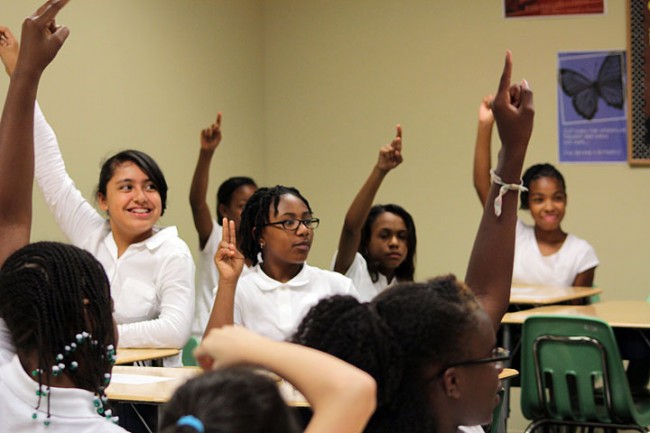by Georgia Center for Opportunity | Feb 7, 2014
In a recent article addressing school choice alternatives – particularly the Georgia Tax Credit Scholarship program and its $58 million annual cap – some integral details regarding the execution of various school choice alternatives were somewhat blended together. We thought we’d take a minute to unpack some details about school choice and public funding of education.
First, the Tuition Tax Credit program is not a voucher program; rather, it simply allows individuals and corporations to donate money to Student Scholarship Organizations (SSO’s) that award scholarships to kids to attend private schools. A large number of these kids come from poorer families. Individuals or corporations contributing to SSO’s are eligible to receive dollar-for-dollar tax credits against their Georgia income tax liability for that year.
Second, those scholarships can only be used for private schools, not for homeschooling and not for charter schools. In fact, charter schools ARE public schools. So for what it’s worth, when a child leaves a traditional public school in order to attend a charter school, by definition, all the money being used to educate that child is still being spent by a public school.
Finally, it’s important to know that when a child leaves a traditional public school, the school no longer has the financial burden associated with educating that child. Additionally, the child rarely takes all of the money with him/her; a portion of the money – how much depends upon the program – stays at the original school. Typically, the amount the school keeps is not greater than the amount that is lost, but it hardly matters because they are keeping some portion of the money designated to educate a child who is no longer there. That means that on a “per pupil” basis, the school does have more money after a child leaves to take advantage of one of the state’s school choice programs.
Given the span of time in which the tax credit cap was met, it is apparent that Georgians are eager to exercise choice when it comes to seeking the best educational options for their children. As previously discussed, this high demand is no surprise but there are still many Georgia students in need of the opportunities presented by programs like the tax credit scholarship.
by Georgia Center for Opportunity | Feb 6, 2014
By Dr. Danielle LeSure, GCO’s Director of Education Policy
Amazingly, over 600 students, parents, teachers, and school leaders crowded the Capitol in the middle of a snow storm to cheer for school choice options—charter schools, public school transfers, special needs and tax credit scholarship programs— on Tuesday, January 28.

-
- Students have their photo taken to share their support of School Choice through social media.
After touring the Capitol and visiting with legislators, students were greeted by never ending snow flurries. While waiting for the rally to start on the steps of the Capitol, Governor Nathan Deal (GA) announced the closing of all state government buildings. Georgia Center for Opportunity’s Vice President Eric Cochling approached the crowd of students that were dancing to the song “Happy” from Despicable Me to deliver the news and lead everyone in a cheer. From the streets surrounding the Capitol you could hear voices shouting “more school choice, more school choice.”

-
- Eric Cochling addresses the crowd at the rally and leads the cheers of “More school Choice!”
Though we were unable to hear from our scheduled speakers Governor Deal and actress Keshia Knight Pulliam who are strong supporters of choice, we did get to hear from those who benefit most from school choice—Georgia students. As they left, their footprints in the snow symbolized Georgia’s journey in the school choice movement. While we have many options in Georgia, there are still over 5,000 students on waiting lists for charter schools and many more students longing for a better option but private school costs are not affordable for their parents.
Georgia does not stand alone in its efforts to increase support for school choice. During the week of the rally, there were over 5,500 events nationwide celebrating school choice options. This is a record high according to an article by National School Choice Week.

- Two students showcasing the signs they prepared for the rally.
If you are or know of a parent who needs more information about choice or would like to become an advocate please visit the Georgia Parents Alliance. Together, we can continue to make a difference!
by Georgia Center for Opportunity | Feb 3, 2014
Should you have any questions or comments about the content of this update, please email Eric Cochling.
Weather Dominates Week
As the General Assembly meets today for day 14 of the session, the subject dominating the headlines is the two days of utter chaos on Georgia’s roads this week. With so many children stranded at school and commuters stranded in their cars, the official response to the snow quickly took on political dimensions.
Our 5th Annual School Choice Celebration and Rally was cut short by the weather, but not before many of our participants were able to voice their support of school choice with their legislators. Thanks to all of our partner organizations, volunteers, and participating schools for braving the weather to show their support for more school choice options in Georgia. We’d like to especially thank the Georgia Charter Schools Association, Agudath Israel of America, Americans for Prosperity, Grace Scholars, Students First, and Hennessy Transportation for their partnership in hosting the event.
Legislation, Study Committees, and Rumors to Watch
– Education –
Given the high demand for Tax Credit Scholarships, Rep. Ehrhart (R-Powder Springs), introduced House Bill 759 that would raise the cap on the program from $58 million annually to $100 million, nearly doubling the size of the program.
In other education news, supporters of Parent Trigger legislation (House Bill 123) are hoping to see it resurrected this year after gaining some traction last session but ultimately failing to make it out of the General Assembly.
Finally, whatever your thoughts about the DeKalb School Board, it does seem strange that the private organization accrediting our school districts (SACS) is, itself, not subject to transparency, especially in regard to how it makes its accreditation decisions. Those decisions impact the public interest in a major way and should be open to public scrutiny. The Attorney General is right to be pressing the case.
– Adoption and Child Welfare –
Rep. Buzz Brockway (R-Lawrenceville) introduced House Bill 524 last session with the goal of making it easier for adopted individuals to access their original birth certificates and the information about birth parents they contain. The legislation, which is being reconsidered this session, was met with opposition by those concerned that disclosing information about birth parents could discourage adoption.
House Bill 771, sponsored by Rep. Jason Spencer (R-Woodbine), would effectively lift the statute of limitations related to civil claims for damages brought by victims of childhood sexual abuse. Currently, the law requires these claims to be brought by a victim within five years of turning 18 years old. Should this bill become law, suit could be brought against a defendant at any time.
– Constitutional Convention? –
Citing a crushing federal debt burden, continued overspending, out of control federal mandates, and overreaching constitutional interpretations, Senate Resolution 736, sponsored by Sen. Cecil Staton (R-Macon), calls for a constitutional convention of the states to amend the US Constitution. Presumably, the convention would allow for the states to address the problems cited by the resolution. Of course, any convention would also open the Constitution up to mischief, so caution is in order.
– Expansion of Medical Marijuana –
Rep. Allen Peake (R-Macon) introduced House Bill 885, referred to as Haleigh’s Hope Act (warning: link is to a heartbreaking video) on Tuesday which would expand the permissible medical uses for marijuana to include the treatment of seizure disorders. Under current Georgia law, extracts made from marijuana may be used to treat cancer and glaucoma patients only. Unlike other states that have recently legalized the recreational use of marijuana, House Bill 885 specifically states that it is not intended to encourage recreational use and requires the delivery of the drug to be accomplished in the ways virtually all other drugs are delivered (i.e. via pill, liquid extract, etc.) and forbids smoking as a form of delivery.
Upcoming Events
Our friends at the American Federation for Children are hosting a nonpartisan candidate training school in Atlanta on February 22nd. The training is free but requires registration to attend. For more information, please see this flyer for the event or email Brian Pleva to register.
Thanks to Jamie Lord, our director of government affairs, and Jacob Stubbs, our legislative intern and John Jay Fellowship alumnus for their able contributions to this update.
by Eric Cochling | Jan 27, 2014
Just this past week, Georgia’s Tax Credit Scholarship program reached its cap of allowable donation commitments (currently, $58 million) in well under a month. That’s the earliest the cap has been reached in the program’s history, three and a half months earlier than last year, when the cap was reached on May 9th.
Add to the early cap the fact that Student Scholarship Organizations (SSO’s), those groups tasked with distributing tax credit scholarships, nearly universally report long waiting lists of students seeking a scholarship and it becomes clear that the program is in high demand.
Of course, it comes as no surprise that a school choice program in Georgia is overrun with interest.
Charter schools have long experienced high demand, with lotteries becoming necessary to decide which children are selected among the many who want to attend. Of course, parents are expressing their desire for additional choices in other ways, including sacrificing to send their children to private schools and, in an ever growing trend, teaching their children at home.
Given Georgia’s record on educational achievement, it’s really no wonder parents and their kids are looking for something better. That said, the desire for choice often has as much to do about wanting to escape an unsuitable school environment as with academic achievement.
That’s exactly why we’re hosting a rally at the Capitol tomorrow to celebrate National School Choice Week. While we are happy about the progress Georgia has made in increasing education options in recent years, less than 1 percent of Georgia’s more than 1.6 million students has been able to access Georgia’s school choice options.
Our tax credit program cap of $58 million annually may seem like a lot but compared to other states, it’s just a beginning of what’s needed to meet the demand. Florida’s program, for example, is currently capped at $286 million annually and grows each year automatically while Louisiana’s program has no cap at all.
Not only are Georgia’s current school choice programs limited, but for the 57% of Georgia students who are eligible for free and reduced-price lunch, options are limited yet again because – unlike wealthier families – they are often unable to move to a district with better public schools.
The net result is that if the local public school isn’t suitable for them, they have nowhere else to turn.
With many billions of dollars spent in Georgia each year on public education, there is no excuse for a child being trapped in any particular school. We should demand more for Georgia’s children.
by Eric Cochling | Dec 20, 2013
Our team at GCO had the privilege of hosting Dr. Rick Hess this week. On Tuesday, Dr. Hess, who is an education scholar (and prolific writer) with the American Enterprise Institute, spoke at an early morning breakfast attended by a group of about 45 people that included politicians, lobbyists, academics, parents, and policy wonks.
While the crowd was diverse, each person shared a common concern about the depressing condition of public education in the state of Georgia and wanted to hear Dr. Hess’ thoughts on the subject. He didn’t disappoint.
Using his book Cage-Busting Leadership as the springboard, Dr. Hess challenged the group to consider how much innovation and real reform could be achieved within the current education system if administrators, teachers, and concerned parents stopped taking “no” for an answer.
He shared example after example of people who were able to break through the “cage bars” erected by overly risk-averse school system lawyers or years of outdated rules that still clogged school procedures and hamstrung teachers from addressing student needs.
The bottom line: With a little questioning and a lot of grit, it is possible to change the system so that children receive better educations.
Although Dr. Hess focused on ways to improve the system from within, he didn’t shy away from endorsing school choice as an important tool for giving children more and better options – and incentivizing the public system to improve. Wisely, though, he warned the audience that just changing laws – even something as significant as vouchers – will not be sufficient in itself to really change education if everyone at the school level simply continues to accept business as usual.
In addition to legal reforms that allow parental choice and school flexibility, we must have pioneering and system-challenging educators and parents willing to question the status quo every time any engrained practice misses the mark of promoting our children’s best interests.
Those were all great points by Dr. Hess and a wonderful reminder that we have more power to change things than we may realize just by asking the question “Why not?”
Join us in asking that question and pushing for reforms that free parents and children to have more educational options and free excellent teachers to change lives.
by Georgia Center for Opportunity | Oct 9, 2013
As Breakthrough fellows at the Georgia Center for Opportunity (GCO), experiences in the community provide unique insights and personal touches to the research they lead. Recently Michael, Yenipher and Aundrea had the opportunity to visit Ivy Preparatory Academy, an all- girl charter school in our backyard here in Norcross, GA.

-
- Students at Ivy Prep practice their “ones” and “twos”. Courtesy: Ivyprepacademy.org
Michael:
From the moment we arrived I could tell Ivy Prep is devoted to one powerful mission – developing college-ready scholars. And not just for any college – this school strives to prepare its students to be scholars at our nation’s most prestigious colleges and universities.
Touring the campus, friendly student ambassadors directed us from classroom to classroom where we noticed that each time a teacher asked a question, instead of raising their hand or avoiding eye contact with the teacher, students would raise one or two fingers indicating that they either knew the answer (“ones”) or were unsure of it (“twos”). This method of student participation was just one unique aspect of the Ivy Prep culture we became familiar with during our tour.
Culture is a critical component in creating the unique setting at Ivy Prep. A week prior to starting sixth grade students learn to raise one or two fingers when responding to a question, what to wear and what not to wear, how they are to behave transitioning between classes, and so forth. This week of training, known as “Culture Week”, sets the tempo for the remainder of their educational experience at Ivy Prep. Additionally, the culture prepares students to thrive in alternative classroom settings. For high schoolers at Ivy Prep, an integrated technological approach– or blended learning model– allows students to complete all of their courses online with the exception of math and language arts providing more freedom to work at their own pace.
Yenipher:
While Touring Ivy Prep, there were posters of different colleges and universities, motivational quotes and pictures of role models everywhere. Interacting with a group of girls waiting outside a classroom, they spoke well of their school experience, were well disciplined, educated and motivated to go to college.
The visit solidified the importance of educational attainment. Parents sometimes underestimate the large percentage of time children spend in school, the importance of the quality of their education and the environment that shapes their development. It can take extra steps to find the right school for your child, but it can make a difference of a lifetime.
Through the example of Ivy Prep, it seemed many more students in Georgia can benefit from opportunities such as these. Many parents are just not aware of Ivy Prep or similar schools and how it can transform a child for the better. Parents need to value educational attainment in order for their child to do so. One values educational attainment by making sure that the school their child attends produces quality results and instills principles the parent believes in.
Aundrea:
Within the beautiful facilities of Ivy Preparatory Academy, it touched me as a woman of color to see such a diverse group of young ladies being directed to “Believe. Achieve. Succeed”–the school’s foundational motto. Likewise, the evident culture of college at Ivy Prep, attentive participation within the classrooms, and stylishly uniformed students bustling about all served as a great introduction to charter schools for me.
More than 2.3 million students now attend charter schools across the U.S., and these innovative models are quickly becoming staple education options in communities all around Georgia. For parents exploring alternatives to a traditional public schools, theses charter school settings can be positive learning environments for kids. Additional time in the classroom, blended learning models, and the single gender setting–which was adopted to give girls a chance to just be themselves–are some of the ways Ivy Prep aids their students in becoming successful scholars. And all without steep tuition costs!
Still, it is important to remember charter schools face obstacles similar to traditional public schools–such as constricted funding and surpassing state academic standards. If you are considering alternatives to traditional school settings it is important to be thorough in your search for finding the right learning environment for your child. There are many charter schools in the Metro Atlanta Area, so look for schools that fit your child’s interest or offer special programs. Take a tour of a school you are interested in to see the learning model in action. Investigate what success the school has had by checking out testing scores and college placement results. Or ask others in your community about their experience with charter schools. These were all important lessons from our day with the Ivies.



